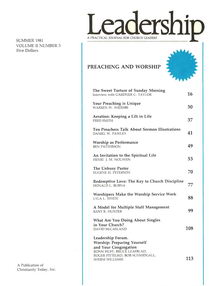My missionary career in Japan began with less than two years of language school in Tokyo. I was then assigned to the large city of Fukuoka on the southwest island of Kyushu. My principal assignment was student evangelism, but soon I began to pick up other responsibilities.
One was the exciting but formidable task of teaching three Bible classes in the local prison, an equivalent of our state penitentiaries. I was asked to do this for a year by a veteran missionary who was about to leave on furlough. Only as I approached the first session in the fall did it begin to dawn on me that I might have bitten off more than I could chew. My predecessor had been born in Japan and knew well both the Japanese language and culture. I could barely carry on a simple conversation. I had a miniscule biblical and theological vocabulary in Japanese, and could not even give a simple testimony with any fluency. Yet I was going to conduct Bible classes in Japanese with three groups of prisoners, most of whom knew practically nothing about the gospel!
Moreover, two of these three groups were in the wing where the condemned prisoners were kept. “Condemned” means they had committed murder and were waiting for the day when a directive would come from Tokyo that they were to be executed.
Despite these well-founded fears and apprehensions, I kept going to the prison week after week. The excitement soon wore off and discouragement increased. The setting was grim: a small, dark, drab room in which eight to ten men in each group gathered, accompanied by an unsmiling armed guard who sat off in one corner.
As winter set in, the unheated rooms were even more depressing. More important, I became increasingly aware of my ineptitude in reading my meditations on Philippians, which a student assistant had translated for me. I had the feeling at times that nothing was getting through to these prisoners. The only bright spots were the singing of the men- especially in one class-and the friendliness of two men in one group. They had become Christians the previous year and exerted a wholesome influence on the others.
I never seriously considered quitting, but I began to long for the return of the senior missionary. 1 had no opportunity to get to know these men, for the guard quickly led them back to their cell blocks after each session; and all I could conclude from their expressionless faces was that I was against a stone wall.
One spring day, however, something unusual occurred. I noticed after one class two men were arguing with a guard. Suddenly he relented and I heard him say, daijobu (okay), and then three men approached me while the guard stood nearby. “Reverend Hesselink,” they began, “for several months now we have been studying God’s Word with you. You have told us that God loves even condemned prisoners like ourselves, and that Jesus died for our sins and will forgive us if we repent and believe in him. We do believe this. We also have read that we must be baptized and confess that we trust him as our Savior. Will you baptize us?”
I was stunned. Had I heard correctly or was I dreaming? At first I didn’t know what to say. Then I turned to the guard and asked him if this would be possible. He told me I would have to ask the director of the prison. The director was not very encouraging, but the next week, during which many prayers were offered on behalf of this cause, he told me he had decided to permit the three men to be baptized in his office. He also gave permission for a Japanese pastor to assist me. (I needed help with reading the liturgy for baptism.)
What a glorious day that was when we gathered for that special service. I didn’t understand all of their simple but beautiful testimonials, but T understood enough to know that these men had come to understand the fundamentals of the gospel, and that their faith was sincere.
Soon afterward the senior missionary returned; and shortly after that a number of condemned prisoners were executed-including my three brothers in Christ. My missionary friend was with them prior to their execution, and he told me they left this world with quiet assurance and the joyful anticipation of seeing their Savior face to face.
The lesson here is one we need to learn again and again. There is the temptation to believe that it is not so much the Word itself but our presentation of the Word that brings about conversion and new life in Christ. Without realizing it, we may subtly indulge in a form of an old heresy called synergism. That is, in reality we believe God’s Word and Spirit alone are not sufficient; much also depends on the effectiveness of our witness. I don’t care how high a view of the Word of God you may have; I submit that most, if not all, of us believe that for God’s Word to be effective, our competence is not unimportant.
Please don’t misunderstand. The reception of the gospel by both believers and unbelievers is greatly influenced by the credibility of the one who bears witness and the clarity of that witness. But where saving faith results, hopefully, we can conclude with Luther, “The Word did it.”
To paraphrase Zechariah 4:6, “Not by might, nor by power”-nor, I would add, by our eloquence or cleverness or charm-“but by my Spirit, says the Lord of hosts.” We are mere servants and stewards of the mysteries of God (I Corinthians 4:1). We can plant and water, but it is ultimately God who makes possible the harvest.
-John Hesselink President, Western Thleologival Seminary
Copyright © 1981 by the author or Christianity Today/Leadership Journal. Click here for reprint information on Leadership Journal.









